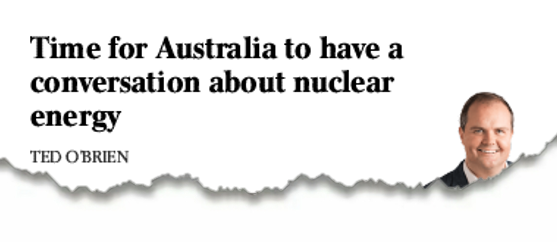As published in The Australian on 9 December 2022
When Prime Minister Anthony Albanese delivered the keynote address at last Friday night’s Gough Whitlam Dinner, he missed a golden opportunity to tell the
Labor Party faithful about the role of nuclear energy in Mr Whitlam’s platform to win office 50 years ago.
If the PM’s speech had started with Whitlam’s plan for uranium enrichment and nuclear power, it could have seamlessly transitioned into comments from Labor’s
longest-serving leader, Bob Hawke, who said that nuclear energy would “be a win for the global environment and a win for Australia”.
Ironically enough, last Friday wasn’t just the anniversary of Whitlam’s election win but also World Nuclear Energy Day.
It’s a pity the PM is opposed to a mature national conversation about nuclear energy, but the voices of the Australian people still want to be heard. Although there are no nuclear power plants in Australia, nuclear technology isn’t new to our country.
We possess the world’s largest reserves of uranium and we’re the world’s fourth-largest supplier.
Just 30km from Sydney’s CBD is a nuclear reactor that has been safely producing nuclear medicines for over 60 years, including diagnostics and cancer treatments.
Only last year, Australia turned to nuclear-propelled submarines as part of our solution to address future strategic challenges.
And yet, despite 33 countries currently operating nuclear power plants and another 50 looking at doing so, our government can’t understand why any Australians want nuclear energy at least considered.
Here are three reasons why it should be.
First, we’re amid an energy crisis and electricity prices are set to rise another 56 percent by the end of next year.
Households are hurting and businesses are on their knees.
About 800,000 manufacturing jobs are under threat, supply shortages could lead to blackouts and regional communities worry they’ll be steamrolled by the government’s rush to install 22,000 solar panels a day, 40 new wind turbines a month and tens of thousands of kilometres of transmission lines.
As the government continues to demonise gas and encourage the premature closure of coal-fired power stations, the crisis will only deepen.
Recent announcements will see about 20GW of capacity shutdown by 2035.
That’s about 80 per cent of baseload generation gone from the National Electricity Market – with no guarantee of a replacement in time.
Other countries also face serious energy problems, but they are extending the life of their baseload power plants or restarting mothballed ones as we plan to blow ours up. As other nations are expanding their nuclear fleets or introducing nuclear energy, our government doesn’t even want to talk about it.
Second, there’s climate change. Nuclear energy is the cleanest industrial-scale source of energy generation the world has ever seen.
Its energy density is unparalleled and the fact it produces no greenhouse gas emissions during operation explains why so many like-minded nations see it playing such a big role in their plans to reduce emissions.
The International Panel on Climate Change considers nuclear energy a “mitigating technology” for climate change.
All four IPCC pathways to achieve the goal of limiting the temperature rise to 1.5C include nuclear energy.
The United Nations’ Envoy on Climate Action and Finance claims to have never seen a credible transition strategy that did not include nuclear.
And the US Special Presidential Envoy for Climate, John Kerry, said at COP27 last month: “We don’t get to net zero by 2050 without nuclear power in the mix.”
Third, the advances in nuclear technology can’t be ignored. Not only does nuclear offer low-cost and consistent 24/7 electricity, but it also has the capability to “load-follow”, ramping up and down to accommodate the volatility of weather-dependent renewables.
It has also proven to be the world’s safest source of energy production. When I chaired a parliamentary inquiry into nuclear energy in the last term of government,the biggest lesson I learnt was the importance of a social licence; community acceptance is a prerequisite for nuclear energy.
This is why the Coalition wants to put the Australian people at the centre of this national conversation.
Last Friday, I launched “Time to Talk Nuclear”, which aims to include the Australian people in a national conversation about the possibility of advanced nuclear technology forming part of our future energy mix.
Members of the public are invited to complete a two-minute online survey at timetotalknuclear.com.au.
People’s responses will drive further public engagement over coming months as we openly assess the benefits, concerns and outstanding questions on nuclear energy.
Participation from all interested Australians is welcome, and that includes Prime Minister Albanese, who would prefer this conversation not take place.
After reflecting on the pro-nuclear positions held by Whitlam and Hawke along with members of today’s union movement, I wonder if the PM might open his mind to a mature discussion.
Ted O’Brien is the Liberal member for the seat of Fairfax and opposition spokesmanfor climate change and energy.
Download a .pdf of the article HERE.
